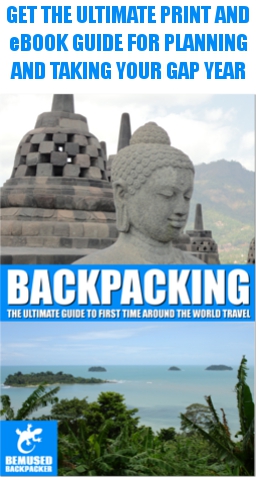
Volunteering on your gap year can be a noble and altruistic act that has a huge positive impact to a cause or a community, or it can be an entirely selfish act that does more harm than good, but at least gets you a good selfie for your social media profile. Quite often the difference betwen the two is your motivation and how much thought and planning goes into it beforehand.
Volunteering Or Voluntourism.
When deciding on whether or not to volunteer on your round the world travels, there are a whole host of things you need to consider before you take that next step, including if it is right for you at all.
Some of these considerations are pretty obvious, such as what type of field or placement you want to work in or which country or community you want to go to, but it goes much deeper than that too. You need to consider if the volunteer programme is right for you, as well as whether or not you are right for it. Taking time to ask yourself and others these questions will make your volunteering experience much better and richer, ensure you choose the right people to volunteer with, and perhaps more importantly decide whether it is the best thing for you to do or not.

Your Motivations.
Why Do You Really Want To Volunteer Abroad?
Ask yourself very carefully why you want to volunteer, and be honest with yourself. Volunteering isn’t for everyone, and it is more than okay to admit that. As great as volunteering can be there is no mandatory rule for travellers to do it and it is okay to just enjoy your travels too.
The simple fact is if your motivations aren’t right it can lead to a bad experience for both you and the project you volunteer with. The wrong motivations can lead to poor decisions and a lack of questioning on both sides.
If you simply want to volunteer to tick off a bucket list check box, and some people do, or you think that volunteering is just ‘something you do’ on your gap year, then you may end up choosing a voluntourism programme that does not contribute in any way to the community or project – or even does harm to them – all because you thought it was cool to get a profile photo with a baby rhino or hugging some poor children in an African village. I mean what does it matter if you do actual good as long as you have something to brag about back home and you get to show what a saint you are because you think international volunteering somehow makes you special. If that is your intention, then you may be better off just travelling and expanding your mind a little instead.
If your intention is to save the world or to solve all the problems in the third world in the three weeks out of your travels you have allocated for the experience, then perhaps you need to think again. Disempowering and patronising local populations or causes by having a patriarchal attitude of western superiority does far more harm than good, and is one of the hallmarks of some of the worst voluntourism companies.
Volunteering is a two way street, you should be going there to support and assist local projects or causes. You should be wanting to give the gift of your time and skill with the intention of empowering them to an extent that they can come self sufficient without needing the aid of the western world, and at the same time learning from them too. And if your motivation is to genuinely help and give back, then this is what you will be doing. The locals and the experienced staff already in place are the experts in what that particular community, project or cause, not you, and unless you are going there with a professional skill and qualification you are there to learn and support as much as you are to give. If you want to contribute to a project with this in mind, then you will be able to help so much more and get so much more out of the experience.
What Do You Want To Get Out Of The Volunteer Placement?
This is an important question to ask yourself, as volunteering really can give you as much as – if not more – of whatever you put in. Ask yourself how you see the volunteer experience affecting you both personally and professionally. Ask yourself what your career goals are and where you want to be in a few years time, and ask how this volunteer placement can add to your skill set or make you grow into the person who can achieve those goals. Ask how you can utilise the experience on your CV to help you get the right type of job when you get back home. Ask all these questions and more.
It is okay, in fact it is essential that you get as much out of the time and experience as you put in, and it is okay to admit that this will be part of your motivation to volunteer.
Your Own Abilities And Expectations.
How Realistic Are Your Expectations Of Your Volunteering Opportunity?
Ask yourself honestly what you expect from the volunteering experience as a whole. What do you think it is really all about and what do you think you will actually contribute when you get there? Do you think it will be spending a few hours a day doing a little menial work before having a photo opportunity with some small children or animals and then heading back to your nice air conditioned digs surrounded by local amenities? If so you really need to give yourself a reality check.
Volunteers often have romanticised notions of what it is like to be a volunteer. They think of Doctors and Nurses working under fire in conflict zones, of medics dishing out essential medicines and inoculations in a medical tent set up in the middle of a relief effort. They imagine single handedely nursing a cute baby orang-utan or tiger cub back to health before releasing it back into the wild and heading back to their hotel for a shower and a hot meal.
It isn’t like that at all. Not least of which because most travellers who want to volunteer aren’t qualified to do the types of jobs they imagine doing, but the conditions they will be working under often aren’t perfect either. If they are, you are most likely doing a fake voluntourism activity in a holiday resort.
Many of the most needy and deserving of volunteer opportunities may only have basic, bare bones accommodations. You may find yourself roughing it in hammocks under mosquito nets with cold showers and little or no privacy, where you need to be tolerant with some really good interpersonal skills. The hours of work are often long and hard, and in some cases – particularly for skilled volunteers who work in medical clinics or relief zones for example – the environment can be stressful and sometimes harrowing. You may be heading to areas way outside of your comfort zone, where your values, expectations and ideals will be challenged in ways they never have before.
Not every opportunity is like this of course. Some organisations have projects in stable areas where accommodation and amenities are more set up for the conveyor belt of voluntourists who come through. That doesn’t mean they are bad, but you should look at exactly what and who those activities are benefitting. Others may expect you to find your own accommodation in any number of comfortable nearby hostels or guesthouses. Some opportunities are in local, rural communities that are friendly and welcoming. Whichever volunteer agency or opportunity you choose will have its own specific set of circumstances that you will need to look at and make an informed decision on whether it is right for you or not. Either way you will have to be prepared for the fact that you will have your expectations challenged, and ask yourself honestly if you can deal with that.
How Independent Are You?
Are you happy and able to be dropped into a situation far outside your comfort zone alone and just get on with things? Or do you need a little support or have a group of people with you who you can relate to and use for support if necessary? Ask yourself this question very carefully and again, be honest with yourself, because different volunteering opportunities will require vastly differing degrees of stepping outside of your comfort zone. There is no right or wrong answer here, it completely depends on you as an individual. Some people are better with others around them whilst some people prefer more independence. Either way you need to think carefully about which type of person you are and choose a volunteer organisation or project that will meet your requirements.
What Skills Do You Have?
Of every expectation that travellers need to manage, this is probably the biggest. Volunteers with professional skills and qualifications are obviously in high demand, and there are a whole range of professional and technical volunteer programmes and agencies who will allow them to use their skills to the best advantage of the community or project they are serving. But these programmes are for those with the skills, qualifications and experience to make a difference in those roles.
That doesn’t mean that those people without professional qualifications can’t volunteer however, far from it. There are so many volunteer opportunities that don’t require any skill or qualification, just a good attitude to hard work and a willingness to learn. In fact out of all the most common traveller volunteer programmes there are far, far more of these than there are organisations seeking professional qualifications.
Volunteers without professional skills and qualifications still have a lot to give, not least of which is their time and energy. Having boots on the ground is vital to many conservation and volunteer projects and there are so many roles and jobs that require basic labour or can take advantage of your experience in many other areas.
The best organisations have structures in place to ensure that everyone is working to their full potential, this includes matching the right person with the right project or role, making sure that the role you do both supports local professionals (not usurps them) and at the same time gives you the benefit of experience and perhaps even unnoficial training in that role.
What you do need to do if you fall into this group however is manage your expectations accordingly, and this comes back to those voluntourists who think they can get a nice selfie with a tiger cub and go back home. You can’t just rock up and expect to dish out much needed vaccinations in remote villages, assist in the veterinary care of dangerous wildlife or managing an entire project building a school or a clinic. You don’t have the skills or qualifications for that!
What it can mean however is that if you do want a career in animal welfare or simply want to help animals, you can assist the care of the animals by ensuring their habitats are clean and well maintained. If you want a career in medicine you can assist the medics by ensuring equipment is available, setting up work stations or sterilising surfaces in between patients getting some great first hand training in aseptic technique! You can be part of the outreach team that speaks to dozens if not hundreds of locals, flagging certain issues that can then get overseen by qualified staff, who often don’t have the numbers to see everyone. If you want to work in education then you can support the local teachers by being a classroom assistant and helping to manage the sheer numbers of children, but not teach them, or use soft skills such as your native English language to help with conversation or pronounciation. All of which looks good on your CV too.
It is important to emphasise that everyone has a role to play, both qualified and unqualified, but expectations need to be managed and both, regardless of station, are there to act in a supporting role to local experts and local workers.
The Volunteer Placement And Company.
Who are you volunteering for exactly?
This is an extremely important question to ask, as you need to make sure that you are volunteering for the right company or cause. You need to consider whether it is a government agency or a non government organisation (often called an NGO), a totally for profit voluntourism company or a small, local organisation. Are they a religious or secular group or are they affiliated with a particular charity? Do they employ local skilled and unskilled workers? How exactly do they screen you as a volunteer? There are so many different organisations to choose from and choosing the right one can seriously affect how you engage with them. You also need to ask about the company or organisations values or objectives, because if they clash with your own then you aren’t going to get much – or give much – to the experience at all.
Very basically there are so many great organisations out there that you can volunteer with, but so, so many bad and irresponsible ones too, and it is your responsibility to ask a lot of very important questions to find out which is which.
How Are Any Funds You Pay To Them Used?
This is another extremely important question to ask. Many volunteer agencies and voluntourism companies charge money to volunteer with them, and it can be very difficult at first to distinguish the god from the bad. Some are purely for profit companies who give nothing back to the community or project, and actually create problems by manufacturing and imposing voluntourism experiences on a community that doesn’t need or want them. Others give every penny of profit back to the cause or the community project and only use the funds through voluntourism to pay the opertional costs of the project or employ local labour. Some however are in the middle of these two extremes, and may use a portion of the fee you give them to pay for your upkeep and their support of you while you are there, and then give whatever is left back to the community or project. If the agency or organisation does offer support for the money you pay them, ask upfront exactly what you can expect for that money. Does it include food and accommodation? Orientation to the project and ongoing support when you are there? Insurance? Academic programmes and credit or verified skills you can utilise on a CV? Excursions or a stipend when you are there? There are so many agencies to choose from, and some may offer all of these things whilst other may offer none, but you need to make sure exactly what the case is before you hand over your money and head out there. This leads very neatly to the next question you should ask yourself.
Should You Pay To Volunteer At All?
Paying to volunteer is an issue that a lot of people get confused about and ask if they should be paying to volunteer at all. I mean you are already giving them your time right? Well the answer is yes and no.
The no answer is a lot easier to understand. There are many voluntourism companies out there that are there simply to make a profit and exploit both the cause or communities they say they serve and also the good intentions – however misguided – of the hordes of voluntourists who flock to them. This is not volunteering in any sense of the word, this is paying for an experience greenwashed as volunteering and offer no benefit to any cause or local community. These voluntourism companies infest the gap year industry and you have to do your research into the company you are thinking of volunteering with. If their primary focus is profit, don’t pay and stay away.
The yes is still easy to understand, but requires a perception of why funds are needed and questions do need to be asked to ensure that they are genuine and understand as to why it is right that you pay.
Most genuine volunteer organisations charge a fee to cover the costs of getting and hosting volunteers, anything else generally goes straight back into running the charity or the project. None of it should be going to profit making organisations.
For these genuine organisations money is everything, so why shouldn’t you pay for your own room, board and food? If these organisations had money they would pay for a local worker to do the job and put money back into the local economy. So ask yourself when you wonder why you have to pay to volunteer why they should take valuable resources away from the cause or the community to support you? For the volunteers who have educated and highly qualified skills such as vets, doctors, nurses or other specialists in their field, then there are genuine international agencies such as Medicins San Frontieres, the Peace Corps or others who will provide room and board for those skills in return for a long term commitment of a few months or more. For everyone else, frankly you are not valuable enough. You have a role to play and can still help, but you will have to pay your own way.
How Long Should You Volunteer For?
How much time you have to give to volunteering can and should affect the organisation or project you work with. Some volunteer companies or agencies have short term opportunities of a week or so, usually very basic unskilled roles that need labour but are suitable for a high turnover of people, whilst others demand a minimum commitment of at the very least a month, more often than not three or more, especially in the case of professional volunteers such as nurses or vets who may often get benefits such as free accommodation in return for their investment of time and skill. Basically speaking the shorter the placement the less good you will do, the less use you will be to the project and the less you will get out of it. Longer term volunteers will often be accepted into the local community more, they will often live side by side with them, learning customs, language and culture. They will be given more responsibility and get to participate in a range of project jobs, utilise their own unique skill sets and generally be of more use, as well as learning a lot more and gaining new skills in return.
Thinking about these things before you decid to volunteer will not only help you decide if volunteering is right for you or not, but will also help make sure that your time and efforts go to a worthy cause and actually do some good.
Related Articles.
12 Questions You Should Ask Before Volunteering Abroad.
How Backpacking And Volunteering Can Help Your Career.
How To Volunteer With Wildlife On Your Gap Year.
Should You Pay To Volunteer On Your Gap Year?
Spotlight On BAWA, Volunteering In Bali.




